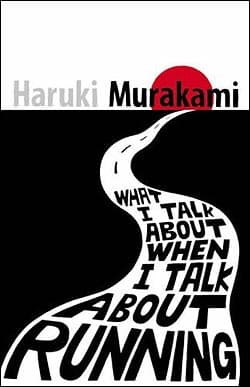What I Talk About When I Talk About Running vs. The Marathon
What I Talk About When I Talk About Running
by Haruki Murakami. In this book, Murakami shares his thoughts and experiences about running and writing. He talks about how he started running in his 30s and how it became a big part of his life. Running helps him think and gives him ideas for his writing. The book is like a diary where Murakami writes about his runs, the races he joins, and how running affects his life and work. He also talks about getting older and how that changes his running. The book is not just for runners but for anyone who enjoys a good story about trying hard and not giving up.
The Marathon
A bit too long and chaffy on the nippies

Top Reviews
@misty-rose-bison-45
I read this book when I first started running long distance. I was living in Chiang Mai and I'd go this huge park a couple of times a week and just run loops around the lake. At the end of my run I'd grab a milk tea and a banana bread from a local coffee shop and just read a few pages. Great memories of many chill evenings, running and reading about running.
| Item | Votes | Upvote |
|---|---|---|
| Easy read | 1 | |
| Motivating | 1 | |
| Peaceful | 1 |
| Item | Votes | Upvote |
|---|---|---|
| No cons yet, would you like to add one? | ||
| Item | Votes | Upvote |
|---|---|---|
| No pros yet, would you like to add one? | ||
| Item | Votes | Upvote |
|---|---|---|
| No cons yet, would you like to add one? | ||
Frequently Asked Questions
'What I Talk About When I Talk About Running' is a book by Haruki Murakami where he shares his thoughts and experiences about running and writing. The book details how Murakami started running in his 30s and how it became a significant part of his life. It serves as a diary where he writes about his runs, the races he participates in, and the impact of running on his life and work. The book also touches on themes of aging and perseverance, making it appealing not just to runners but to anyone who enjoys stories about determination and personal growth.
Pros of 'What I Talk About When I Talk About Running' include it being an easy read, motivating, and peaceful. There are no reported cons at this time.
Haruki Murakami is a renowned Japanese author known for his works of fiction and non-fiction. He has written several bestsellers, including 'Norwegian Wood,' 'Kafka on the Shore,' and '1Q84.' His writing often blends elements of magical realism, surrealism, and existentialism, making his works unique and widely acclaimed. In addition to being an accomplished writer, Murakami is also an avid runner, which he discusses in his memoir 'What I Talk About When I Talk About Running.'
The pros of running a marathon include a sense of accomplishment, improved physical fitness, and the opportunity to participate in community events. On the downside, marathons can be physically grueling, leading to issues like chafing and long recovery times.
Before running your first marathon, it's important to train properly, stay hydrated, and plan your nutrition. Be prepared for a long and challenging experience, and be aware that chafing and other physical discomforts are common.
A marathon is 26.2 miles or approximately 42.195 kilometers long.
Related Content & Alternatives
1  1.What I Talk About When I Talk About Running: A Memoir
1.What I Talk About When I Talk About Running: A MemoirWhile training for the New York City Marathon, Haruki Murakami decided to keep a journal of his progress. The result is a memoir about his intertwined obsessions with running and writing, full of vivid recollections and insights, including the eureka moment when he decided to become a writer. By turns funny and sobering, playful and philosophical, here is a rich and revelatory work that elevates the human need for motion to an art form.
1  2.The Creative Act
2.The Creative Act“I set out to write a book about what to do to make a great work of art. Instead, it revealed itself to be a book on how to be.” —Rick Rubin
0  3.How to Write One Song
3.How to Write One SongThere are few creative acts more mysterious and magical than writing a song. But what if the goal wasn't so mysterious and was actually achievable for anyone who wants to experience more magic and creativity in their life? That's something that anyone will be inspired to do after reading Jeff Tweedy's How to Write One Song. Why one song? Because the difference between one song and many songs isn't a cute semantic trick—it's an important distinction that can simplify a notoriously confusing art form. The idea of becoming a capital-S songwriter can seem daunting, but approached as a focused, self-contained event, the mystery and fear subsides, and songwriting becomes an exciting pursuit. And then there is the energizing, nourishing creativity that can open up. How to Write One Song brings readers into the intimate process of writing one song—lyrics, music, and putting it all together—and accesses the deep sense of wonder that remains at the heart of this curious, yet incredibly fulfilling, artistic act. But it’s equally about the importance of making creativity part of your life every day, and of experiencing the hope, inspiration, and joy available to anyone who’s willing to get started.
1  1.The Wind-Up Bird Chronicle
1.The Wind-Up Bird ChronicleIn a Tokyo suburb, a young man named Toru Okada searches for his wife’s missing cat—and then for his wife as well—in a netherworld beneath the city’s placid surface. As these searches intersect, he encounters a bizarre group of allies and antagonists. Gripping, prophetic, and suffused with comedy and menace, this is one of Haruki Murakami’s most acclaimed and beloved novels.
1  2.Norwegian Wood
2.Norwegian WoodToru, a serious young college student in Tokyo, is devoted to Naoko, a beautiful and introspective young woman, but their mutual passion is marked by the tragic death of their best friend years before. As Naoko retreats further into her own world, Toru finds himself drawn to a fiercely independent and sexually liberated young woman. Stunning and elegiac, Norwegian Wood first propelled Haruki Murakami into the forefront of the literary scene.
1  3.1Q84
3.1Q84She has entered, she realizes, a parallel existence, which she calls 1Q84 —“Q is for ‘question mark.’ A world that bears a question.” Meanwhile, an aspiring writer named Tengo takes on a suspect ghostwriting project. He becomes so wrapped up with the work and its unusual author that, soon, his previously placid life begins to come unraveled. As Aomame’s and Tengo’s narratives converge over the course of this single year, we learn of the profound and tangled connections that bind them ever closer: a beautiful, dyslexic teenage girl with a unique vision; a mysterious religious cult that instigated a shoot-out with the metropolitan police; a reclusive, wealthy dowager who runs a shelter for abused women; a hideously ugly private investigator; a mild-mannered yet ruthlessly efficient bodyguard; and a peculiarly insistent television-fee collector.
1  4.After the Quake
4.After the QuakeAn electronics salesman who has been deserted by his wife agrees to deliver an enigmatic package— and is rewarded with a glimpse of his true nature. A man who views himself as the son of God pursues a stranger who may be his human father. A mild-mannered collection agent receives a visit from a giant talking frog who enlists his help in saving Tokyo from destruction. The six stories in this collection come from the deep and mysterious place where the human meets the inhuman—and are further proof that Murakami is one of the most visionary writers at work today.
0  6.A Wild Sheep Chase
6.A Wild Sheep Chase"A Wild Sheep Chase" by Haruki Murakami is a surreal and captivating novel that combines elements of mystery, magical realism, and postmodernist twists. The story follows a nameless, chain-smoking protagonist who embarks on a quest to find a mystical sheep with a star-shaped birthmark. This sheep holds the secret power behind a dying political and economic leader known as "The Boss." Joined by his enigmatic girlfriend with supernaturally perceptive ears, the protagonist's journey takes him from Tokyo to the remote regions of Hokkaido, encountering bizarre characters and unraveling deep, philosophical mysteries along the way.
3  1.Project Hail Mary by Andy Weir
1.Project Hail Mary by Andy Weir"Project Hail Mary" is a space adventure story written by Andy Weir, the same guy who wrote "The Martian." It's about a man named Ryland Grace who wakes up on a spaceship with no memory of who he is or why he's there. He figures out he's on a mission to save Earth from disaster. The story follows him as he tries to remember his past and complete his mission, which involves a lot of science and problem-solving. Along the way, he meets an alien, and they form an unlikely friendship. The book is full of cool science stuff, suspense, and humor. It's like a mix of a mystery and a space adventure, with a lot of heart. The narration by Ray Porter is superb, with sound effects and excellent voice work.
1  2.Born a Crime by Trevor Noah
2.Born a Crime by Trevor NoahI'm a sucker for audiobooks read by the author and this is one of them. Trevor Noah is a skilled comedian and his stories of his growing up in South Africa are genuinely hilarious. It's like listening to a book-length stand up show.
1  3.Long Walk to Freedom by Nelson Mandela
3.Long Walk to Freedom by Nelson MandelaLong Walk to Freedom is an autobiography by South Africa's first democratically elected President Nelson Mandela, and it was first published in 1994 by Little Brown & Co. The book profiles his early life, coming of age, education and 27 years spent in prison If you're new to South African history, as I was, this is a great starting point. Why not hear from the man who played a key part in it?
1  5.Barbarian Days by William Finnegan
5.Barbarian Days by William FinneganA book about surfing. An autobiography. Pulitzer Prizer winner 2016. Narrated by the author.
2  2.Life Time by Russell Foster
2.Life Time by Russell FosterA book about the circadian rhythm. Apparently, it's really misunderstood, even by your doctor. Read this book to understand your body better. It helped me improve my sleep.
0  4.Ikigai: The Japanese Secret to a Long and Happy Life
4.Ikigai: The Japanese Secret to a Long and Happy LifeDiscover the secrets to a long, healthy, and fulfilling life with "Ikigai: The Japanese Secret to a Long and Happy Life" by Héctor García and Francesc Miralles. This insightful book delves into the Japanese concept of ikigai, or a "reason for being," which is believed to be a key factor in the remarkable longevity of the residents of Okinawa, a Japanese village known for having the world’s highest percentage of centenarians. Through interviews with these vibrant centenarians, the authors uncover how the principles of ikigai—where passion, mission, vocation, and profession intersect—contribute to their happiness and longevity. The book reveals the residents' daily practices, from their nutrient-rich diets and active lifestyles to their strong community bonds and purposeful work. "Ikigai" provides practical advice and tools to help readers discover their own ikigai, offering a blend of cultural wisdom and actionable steps towards a life filled with purpose, health, and joy. This book is a valuable resource for anyone interested in enhancing their well-being and finding deeper satisfaction in everyday life.
2  5.The Disaster Artist
5.The Disaster ArtistThe best book about the best director in the world. It was such a great book it was adapted into a movie. Bet the other books on this list can't say that!
0  13.South of the Border, West of the Sun
13.South of the Border, West of the SunHajime has arrived at middle age with a loving family and an enviable career, yet he feels incomplete. When a childhood friend, now a beautiful woman, shows up with a secret from which she is unable to escape, the fault lines of doubt in Hajime’s quotidian existence begin to give way. Rich, mysterious, and quietly dazzling, in South of the Border, West of the Sun the simple arc of one man’s life becomes the exquisite literary terrain of Murakami’s remarkable genius.
0  4.Fooled by Randomness
4.Fooled by Randomness"Fooled by Randomness" is a thought-provoking book by Nassim Nicholas Taleb that delves into the role of chance in our lives and how we often mistake random events for meaningful patterns. Through a mix of personal anecdotes, philosophical insights, and statistical analysis, Taleb explores how randomness affects the world of finance, business, and daily life. The book challenges readers to rethink their perceptions of success, failure, and the forces that drive outcomes. This book is ideal for readers interested in finance, probability, and the philosophical implications of randomness.
1  1.Meditations by Marcus Aurelius
1.Meditations by Marcus AureliusFrom wikipedia: Meditations is a series of personal writings by Marcus Aurelius, Roman Emperor from AD 161 to 180, recording his private notes to himself and ideas on Stoic philosophy. Meditations are worth reading if only to get a glimpse at the thoughts of a man who lived a life in truly extraordinary circumstances of being a Roman Emperor. It's surprising how relevant the themes of his diaries are two thousand years later.


